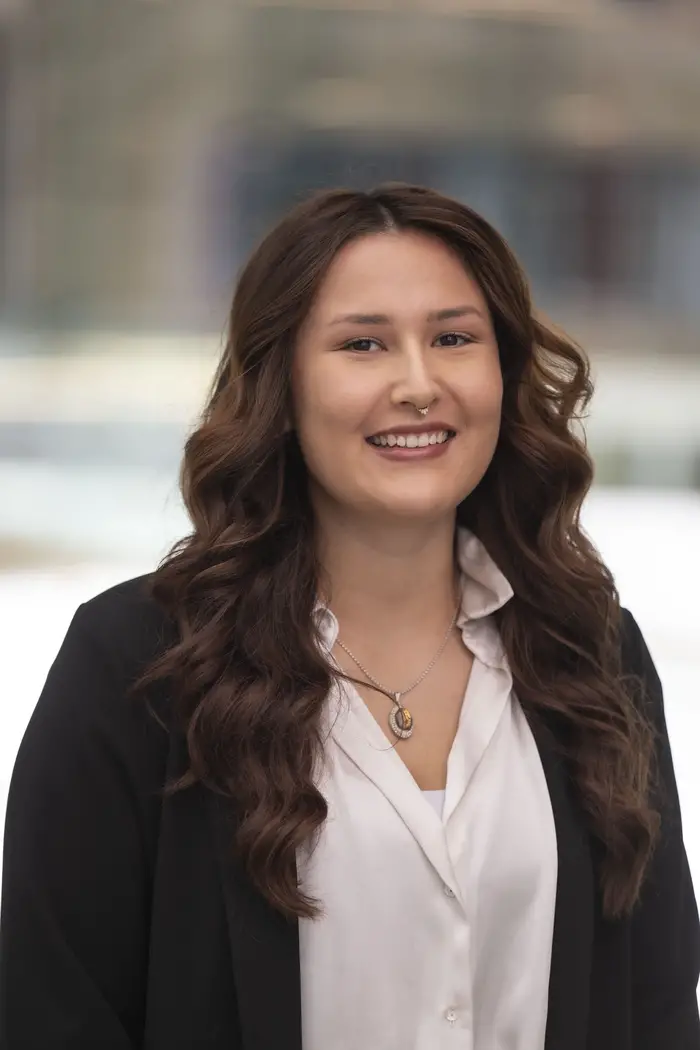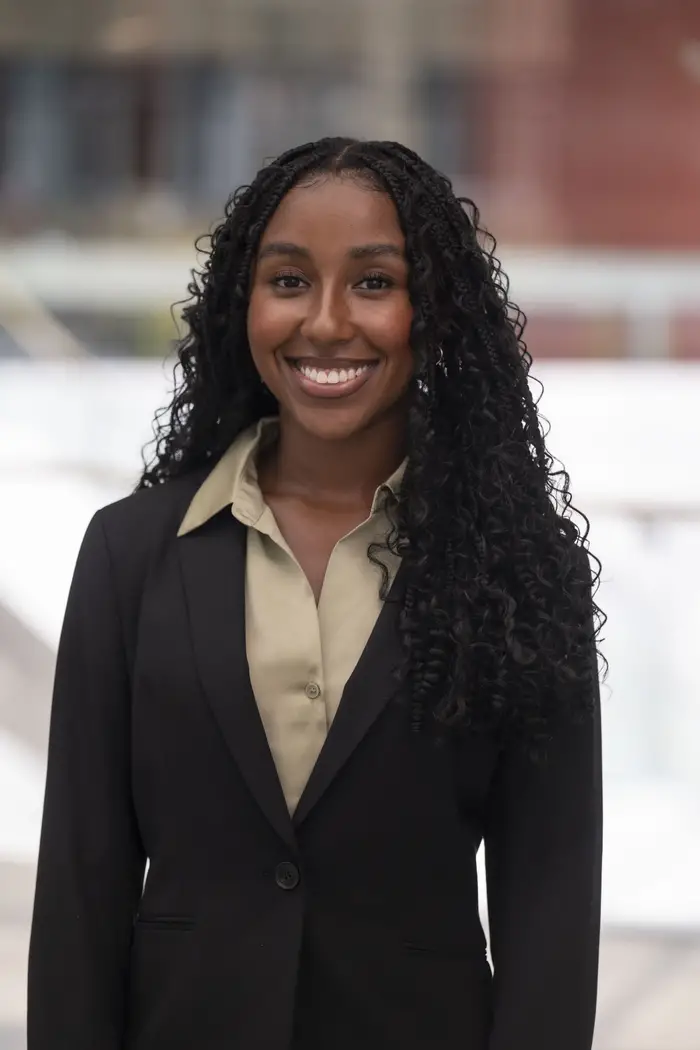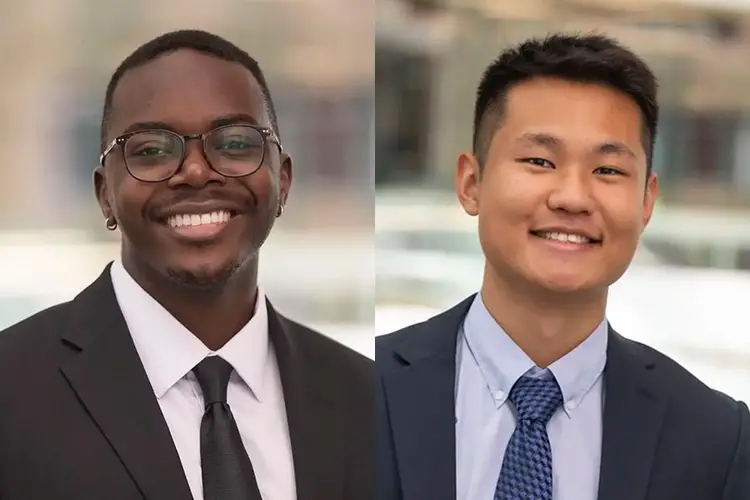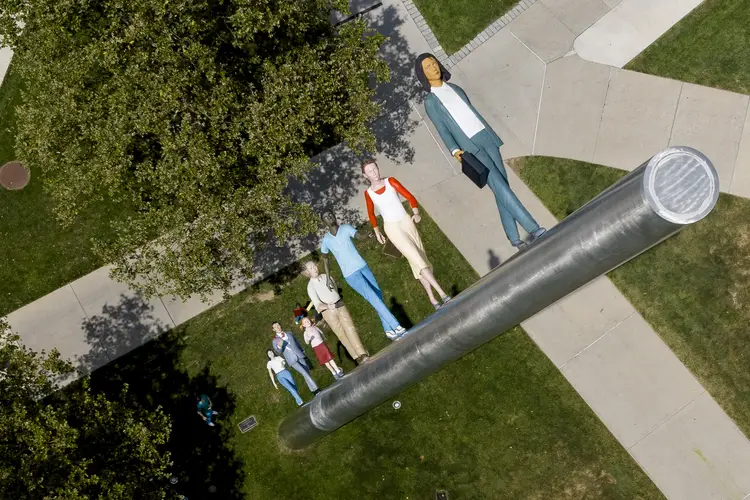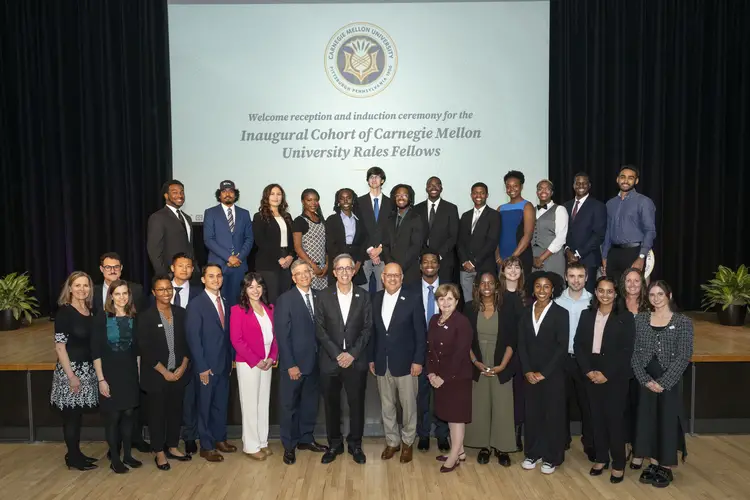Rales HCI Fellows Bring Inclusive Technology to the Forefront of Industry
Media Inquiries
The Carnegie Mellon University Rales Fellows Program brings together some of the brightest minds from underrepresented groups in academia.
The program, launched in 2023, is dedicated to cultivating the next generation of science, technology, engineering and math (STEM) leaders while also increasing access to graduate-level education.
In the age of burgeoning technological change, three students from the first-ever selection of fellows have decided to pursue master’s degrees from the Human-Computer Interaction Institute(opens in new window) at Carnegie Mellon: Lizeth Anaya-Ojeda, Christian Johnson and Zoe Mercado.
Lizeth Anaya-Ojeda
Anaya-Ojeda is a graduate of the New Mexico Institute of Mining and Technology, where she earned a Bachelor of Science in technical communication and a specialization in computer science.
Born in Mexico and raised in the U.S., she has often worked to bridge cultural gaps and help members of her community overcome challenges. She recalls the first time she helped her mother set up a medical appointment when she was just ten years old: "My mother didn’t speak English, so I navigated the call with the receptionist and translated for her. That experience made me realize how language barriers and a lack of technological literacy can make everyday tasks feel insurmountable. It sparked my passion for creating systems that are accessible and inclusive, especially for people who face these challenges," she said.
“I’m a first-generation college student, and so I had to navigate the process on my own. But as I figured it out in high school, I made sure to bring my friends along, guiding them through the same process,” she said. “In rural New Mexico, access to resources for education can be limited, and it's not always easy to find the support you need. Because of that, I always felt a responsibility to help others along the way."
Experiences like this inspired her to choose human-computer interaction as a career path. "I think it’s always been in me—the drive to help people navigate systems or processes that feel confusing or inaccessible. The focus on the human side of these interactions has made me more empathetic and has helped me recognize where human needs can be prioritized and addressed. That’s what drew me to HCI, and CMU stood out as the place to deepen my understanding of how a human-centered approach creates accessible and responsible technology from the start.”
Now, as a Rales Fellow at the university, Anaya-Ojeda is working to help revolutionize the field to make technology more inclusive from its inception.
"To me, technology should be inclusive and accessible by design—something that's built with these principles at the core from the very beginning. Currently, it often becomes a focus later in the process, once we've recognized areas where improvements are needed,” she explained. “Part of the change I strive for is embedding inclusivity and accessibility into the foundation of any technology we design or deploy. This means embracing co-design or participatory design—ensuring that the people who will use the technology are actively involved throughout the entire process, from development to implementation.”
Anaya-Ojeda has already gained experience in learning how to support different populations when developing products through a recent project in the HCI program.
“This semester, I worked with a client and their neurodiverse employees to research how we could better support them and optimize their workflows. The process involved using participatory design, where we directly engaged with the employees throughout the entire design process. We began by conducting user interviews to understand their unique challenges and needs. This gave us a deeper insight into how they interact with existing systems and what would improve their work environment. Based on these insights, we developed initial prototypes and conducted iterative testing to refine the solution, ensuring it met the users' needs and created a more supportive and efficient workflow. By involving the employees from the start, we were able to design with their voices at the forefront, ensuring that the solution was not only effective but also truly user-centered.”
She noted that with the recent growth of artificial intelligence — a field Carnegie Mellon has long been at the forefront of — the question of inclusivity and accessibility becomes even more important.
“I’m excited about the possibility of leading the development and implementation of these technologies, particularly when it comes to making sure that it’s done responsibly and ethically.”
The goal to make technology more inclusive is something that she hopes to carry into the rest of her career.
“In five to 10 years, I hope to lead efforts in responsible AI, driving the development of technology with a human-centered approach. My goal is to contribute to products that take a holistic view of ethical AI, ensuring these technologies are not only accessible to everyone but also designed with a deep understanding of human needs and values. I am committed to driving AI solutions that are inclusive, intuitive, and considerate of long-term societal impacts, ensuring these technologies empower individuals and improve communities,” she said.
In the meantime, she said, the Rales Fellows Program has provided her with the support she needs to thrive at Carnegie Mellon. “Through the program, I’ve built strong relationships with fellows who I know will be lifelong friends. The Rales staff goes above and beyond to ensure we feel celebrated and supported. They create an environment where we can connect, learn, and grow, and always keep us informed about opportunities that help us reach our full potential. Their commitment to our success has made it easier for me to settle into the CMU community and navigate my grad school experience with confidence.”
Christian Johnson
While attending high school in Mason, Ohio, Johnson was passionate about design and visual communication. Early in his academic journey, he developed interests and skills in photography, Adobe Illustrator and Photoshop.
However, as an undergraduate at North Carolina Agricultural and Technical State University, Johnson chose to apply his creativity to a course of study in STEM, earning a bachelor's degree in mechanical engineering. "I really wanted to do things in the automotive space, just working with my hands," he said. "I worked on some projects — one was creating a semi-autonomous vehicle out of a Chevrolet Bolt EV.”
After graduating, Johnson took his skills directly into the industry, working for Microsoft as an engineer on the company’s Design for Excellence team. After volunteering to create a training and onboarding tool for new hires to the organization, he was able to merge his experiences in visual design and engineering.
"It was the start of me learning how to create a website — and in doing that, I learned user research, usability testing, how to prototype in low fidelity and high fidelity. It got to a point where I felt like I could go back and be as creative as I had been while staying within the tech industry," he added.
In March of 2023, the tech industry was affected by thousands of layoffs, and Johnson was one of many who lost their jobs. Still, he was able to continue his professional development and make inroads in the product design space. "I asked what I should do next, and everybody was saying, ‘just learn as much as you can,’" Johnson said.
The learning journey that followed took him to the online learning platform Coursera, where he earned a professional certificate from Google in user experience. He offered to volunteer as UX Designer for a non-profit organization called Orcasound, where he was able to gain valuable skills as a designer on a product team. After then taking his skills to companies like Honeywell and Amazon, his interest in the field of human-computer interaction was at its highest, and he decided to pursue higher education again.
“I started looking around at schools and Carnegie Mellon kept coming up," he said. "I knew that they had one of the best computer science programs in the country, and I also knew a whole host of people who’d graduated from HCII.”
While applying to attend HCII, Johnson also applied for the Rales Fellows program. Having been accepted to both, he is now using experience from all areas of his background to earn his degree — and ultimately, a career in product design or game design — with the support of a like-minded community and professional mentors.
"The fact that the program was trying to close the gap on the ‘missing millions’ really stuck out to me," he said, "There are underrepresented groups that don't have advanced degrees because they're not in a position to pay for them."
Since enrolling, the peers he has found in the program have also provided him with support and community. “I can't emphasize enough how thankful I am for the program, and for the people that they have brought to me. It did it in a way that I didn't know possible — I feel like I connect with every single one of the Rales Fellows and for that, I feel very lucky,” Johnson said. “We're able to come together and recognize who we are as people. Our work is going to get done, but to be able to have a good time while doing that work is huge.”
The future of human-computer interaction is expected to be heavily autonomous. But Johnson said that human creativity will still be needed in the age of AI, and that helping to prioritize that is one of his goals in and beyond his studies.
"When I think about what I'm doing now in HCI and how I'm trying to create products, I see that diversity is necessary throughout all of these products. That can be accessibility, like supporting people with limited motor skills to help type, or using screen readers for vision or low vision screening,” he said. “It can also be from an economical standpoint. If there's a low-income area, how can we get our products out there? How do we get products into the hands of students? How do we get them into HBCUs or other underrepresented communities or institutions?"
Finally, he noted that the structure and support offered by the program itself has been a comfort since arriving as well.
"This program gives us the opportunity and the luxury to only focus on school, and that, for a student, is massive," Johnson said. "I don't have to worry about tuition, which is one of the main barriers of entry in academia for people trying to get advanced degrees. It allows me to learn, unrestricted.”
Zoe Mercado
Mercado is a master’s degree student originally hailing from Brooklyn, New York. As a result of her academic performance in high school, Mercado was selected to be a captain by the Ron Brown Scholar Program, which partners with Carnegie Mellon and the Norman and Ruth Rales Foundation to help identify candidates for the Rales Fellows Program. Ron Brown Captains rank within the top 5% of the applicant pool and receive access to a network of students, organizational alumni, and corporate partners – benefits that extend throughout their undergraduate experience and beyond.
After graduating she traveled to St. Louis, Missouri to attend Washington University in St. Louis for undergraduate studies, where she majored in psychological and brain sciences with a double minor in computer science and human computer interaction.
“It was a very interdisciplinary foundation I had, with social sciences, engineering and also a bit of design, something I shifted to later in my undergraduate career,” Mercado said.
The ability to work across fields and pull from a wide range of studies is something that she found to be very important in her education. “I'm a very interdisciplinary person. I don't want to put all my eggs in one basket — I want to be able to leverage diverse disciplines to really enhance my work and deepen my understanding of the world.”
She has also found cultural understanding to be a key component of her lived experience, particularly during her time at Washington University, and felt a strong desire to consider problems from a global perspective. As president of the Caribbean American Student Association, she was able to stay engaged with her community and creative talents while pursuing her education; and through her university’s computer science program, she studied abroad at the University of Cape Town in South Africa.
“My study abroad experience was truly a pivotal moment in my life. It was my first time visiting Africa, and it significantly broadened my understanding of how people in different parts of the world uniquely engage with technology, particularly in the context of environmental challenges. In South Africa, load shedding regularly limits the electricity supply on a scheduled basis throughout the country. That disruption affects people's access to the internet and subsequently how education is delivered, which becomes important when education is increasingly becoming digitized” she explained. “It inspired me to pursue a globally-focused career that actively integrates the cultural perspectives of users outside of the United States and the West, a passion deeply tied to my own roots, as my family is from the Caribbean.”
After learning about the Rales Fellows Program, Mercado felt motivated to follow her academic interests. “I'd been considering doing a master's in human computer interaction after graduation because I felt like a minor alone wasn't enough experience to enter UX and product roles, particularly in the media, entertainment, and social impact industries,” she said. “I felt like a master's degree would be perfect to strengthen my foundation, but I never really found it to be accessible because I already had undergrad loans. Taking on even more debt just wasn’t feasible.”
Today, as she earns her degree from CMU, her cultural background serves as a constant reminder to challenge one-size-fits-all approaches and design solutions grounded in a genuine understanding of where users are coming from.
“I want to create experiences for people that have been historically underrepresented or overlooked. For example, if you have a disability, or if the languages you speak at home aren't represented in the technologies that you're using, I want to be a part of improving that experience,” Mercado said.
One of the biggest issues about human-computer interaction that she hopes to address through her work is the misconception that technology should be treated as a way to ‘save’ countries outside of the United States.
“People often view technology as a universal solution — assuming if it works in the West then it should work just as well in the global South — leading to the misconception that technology will ‘save’ people from their circumstances when, in reality, they might not even want or need those interventions,” she said. “What works here in the U.S. doesn’t necessarily translate to other cultures. Every community has unique needs and priorities, and we should approach designing for others, especially marginalized communities, without imposing our preconceived notions. That’s the mantra I want to carry throughout my career.”
